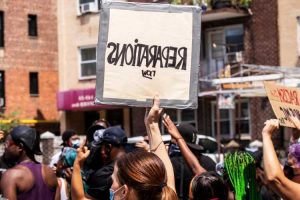Black Americans are getting $25,000 in slavery reparations – but residents are calling the money 'fake' restitution

THE first US city to introduce slavery reparations is facing backlash from black residents who have blasted the $25,000 payments as "fake" restitution and claimed it is "not benefiting me."
Evanston, Illinois, voted in March to approve the first slavery reparations system for black residents in a $400,000 program that was expected to be a blueprint for the rest of the country.
Yet the program has been criticized for being focused on allowing 16 black people to receive $25,000 payments that can only be put toward housing.
Opponents to the program have noted that there are 12,500 black people in the city, which is located north of downtown Chicago, many of whom have been victims or the descendants of victims of discriminatory housing practices.
Black residents in the city were formerly subject to "redlining," a practice through which banks refused housing loans to predominantly black neighborhoods.
It kept black communities from home ownership, a key source of wealth.
Yet Evanston's focus on housing has caused the program to be slammed as "a housing voucher program, not reparations."
"Calling it that does more harm than good," authors A. Kirsten Mullen and William Darity Jr wrote in an opinion piece for the Washington Post.
They added to NBC that true reparations can only come from the federal government and that local programs “cannot meet the bill.”
Black residents also believe that the program places too many restrictions on how the money can be spent.
It excludes renters as it only for current and future homeowners, NBC explains.
And black residents who receive the money will still fall short of a down-payment on a home in the city where averages prices are currently above $400,000.
'DID NOT BENEFIT ME OR MINE'
Residents have also pointed out that the funds will eventually go to benefit the banks and real-estate companies that were previously guilty of the discriminatory practices the program is trying to make amends for.
“The beneficiaries of this program would be those who initially did the harm of redlining here in Evanston,” community organizer Sebastian Nalls told NBC.
“Black Evanston residents need to be determining their own repair."
“I don't want to benefit personally from it,” added another black resident, Priscilla Giles.
“I want the city to move in a way that future generations would benefit from it.”
“I was surprised,” she claims of the program.
“But I can't say that I was any more angry or surprised than when I first heard that the reparations were going to be given for people to buy houses, rather than for something benefiting the whole black community.
"Because whoever got the money, it did not benefit me or mine.”
The program is also facing a potential legal battle from the other side as conservative activists zero in on the city in an attempt to prevent more widespread reparations plans from being introduced nationwide.
“This is a group, race-based benefit, based on a tenuous historical analysis,” Judicial Watch President Tom Fitton said.
“It’s an extremist program.”
Black residents have even welcomed the intervention of the conservative groups as while they say that the intention behind them is "not a good thing," it might "deliver to us what we want to do, which is to stop them in their tracks.”
The reparation payments are to be paid out are part of a $10million plan backed by the city council over the next decade.
To qualify, residents must have lived in Evanston between the years of 1919 and 1969, where they were discriminated against in terms of housing.
Residents are also eligible if they're a direct descendant of someone who suffered housing discrimination.
The $10million fund was raised from a three percent tax on the sale of recreational marijuana as it tries to address inequity in housing.
On a national level, a bill to establish a national reparations committee is sponsored by 170 Democratic members of Congress, but the practicality of implementing a program is still up for debate.
President Joe Biden has not endorsed the legislation but supports a study looking into the creation of a committee.
The potential committee has been discussed by the federal government for decades but a bill calling for more research only advanced for the House Judiciary Committee for the first time in 32 years earlier this year.
Source: Read Full Article



